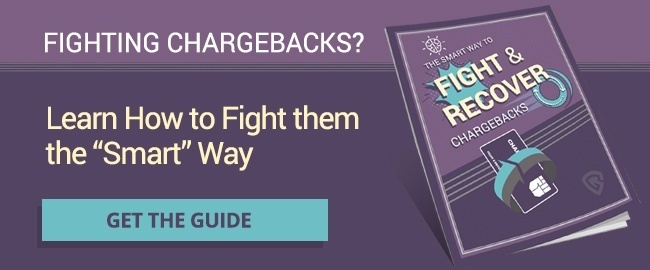How to Fight Bank Chargebacks
With the number of chargebacks getting filed every day increasing, merchants have to be vigilant about preventing them from occurring and fighting them when possible. Chargebacks are enormously costly for merchants—when you factor in overhead and other associated product costs, the typical chargeback ends up costing merchants double the amount of the original transaction.
Most chargeback prevention efforts are focused on managing customer expectations and providing excellent service, but these practices won't help you when the chargeback is initiated—not by the customer, but by the issuing bank.
What is A Bank Chargeback?
It's true—a bank can start the chargeback process rolling without the input or knowledge of the customer.
This usually happens when the bank detects suspicious activity or merchant processing errors.
These chargebacks can come as a surprise to merchants and customers alike, as neither party will necessarily be notified right away that chargeback proceedings have begun.
One major risk of bank chargebacks is that the customer, frustrated that their purchase has been summarily canceled and unfamiliar with the reasons why bank chargebacks happen, will blame the merchant and take their future business elsewhere.
Why Banks Initiate Chargebacks
Banks initiate chargebacks as a protective measure.
When they detect a problematic transaction that looks like it might result in a customer-initiated chargeback at some point, they take proactive measures, placing the burden on the merchant to show that the transaction was valid.
Many different transaction issues can trigger a bank chargeback. These include the following:
- Excessive chargeback activity from the merchant
- Non-matching account numbers, currency types, or transaction amounts
- Missing or invalid credentials (such as the billing address, CVV number, or expiration date)
- Declined or invalid authorization
- Late presentment
- Duplicate transactions
- Signs of fraudulent activity
The issuing bank will provide chargeback reason codes to explain why the chargeback was filed.
Why Merchants Must Fight Back
Many bank chargebacks are caused by simple errors in the transaction process. A single mistyped digit can be the culprit. As with customer chargebacks, some can be prevented by tightening up the transaction process on the merchant end. Verifying credentials at the time of purchase, keeping thorough records of customer activity, and processing payments immediately are some of the best practices that can help reduce bank chargebacks.
The first entry on the above list, however, should be of special concern to merchants.
Getting hit with chargebacks isn't just dangerous for your bottom line, it imperils your ability to affordably and reliably process transactions.
All merchants have a chargeback threshold that represents the maximum number of chargebacks they're allowed within a given time period before their payment processor starts putting limits on their transactions, or closes their account entirely.
It is essential for merchants to prevent, and fight, as many chargebacks as they can. Merchants who lose their accounts can end up forced to use expensive "high-risk" payment processors—just another way chargebacks end up costing them far more than just the disputed transaction amounts.
Prevention & Representment
Prevention is the first and best line of defense against chargebacks. Clear terms and conditions, combined with prompt and attentive customer service, can go a long way toward reducing "friendly fraud" and other customer-initiated chargebacks.
Many payment processing platforms will offer tools for authenticating and authorizing transactions. This can be very helpful in preventing bank chargebacks.
A well-trained staff that follows transaction procedures down to the letter can also play a big role in reducing the errors that prompt banks to initiate chargebacks.
Bank chargebacks that can't be prevented should be disputed, if the transaction was legitimate.
The phase of the chargeback process where the merchant gets to present their case is called chargeback representment. This is when the merchant gets to provide evidence and documentation to the bank to show that the chargeback is invalid and the transaction should stand.
When to Outsource Chargeback Management
Sometimes, it's a good idea to hire a company that specializes in chargeback management. They can provide early notification of incoming chargebacks, help you prepare compelling evidence for representment, and advise you on the best ways for your company to prevent chargebacks from happening in the first place.
It's always important to weigh the cost of fighting chargebacks against the value of the lost transaction, but remember that the consequences of exceeding your chargeback threshold can be dire. If you keep getting hit with bank chargebacks and you can't seem to figure out what's causing them, it's definitely worth getting the experts involved to identify the root causes of your chargebacks.
Thanks for following the Chargeback Gurus blog. Feel free to submit topic suggestions, questions or requests for advice to: win@chargebackgurus.com



